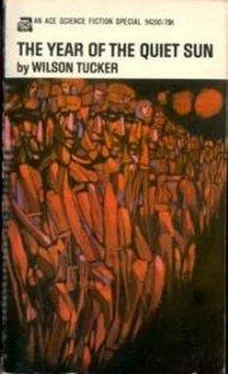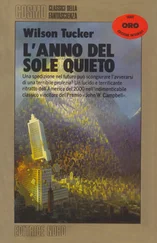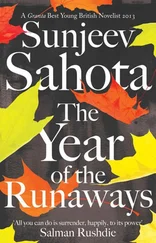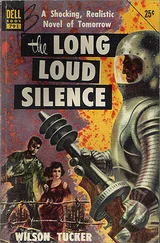Wilson Tucker - The Year of the Quiet Sun
Здесь есть возможность читать онлайн «Wilson Tucker - The Year of the Quiet Sun» весь текст электронной книги совершенно бесплатно (целиком полную версию без сокращений). В некоторых случаях можно слушать аудио, скачать через торрент в формате fb2 и присутствует краткое содержание. Год выпуска: 1970, ISBN: 1970, Издательство: Ace Books, Жанр: Фантастика и фэнтези, на английском языке. Описание произведения, (предисловие) а так же отзывы посетителей доступны на портале библиотеки ЛибКат.
- Название:The Year of the Quiet Sun
- Автор:
- Издательство:Ace Books
- Жанр:
- Год:1970
- ISBN:0-441-94201-6
- Рейтинг книги:3 / 5. Голосов: 1
-
Избранное:Добавить в избранное
- Отзывы:
-
Ваша оценка:
- 60
- 1
- 2
- 3
- 4
- 5
The Year of the Quiet Sun: краткое содержание, описание и аннотация
Предлагаем к чтению аннотацию, описание, краткое содержание или предисловие (зависит от того, что написал сам автор книги «The Year of the Quiet Sun»). Если вы не нашли необходимую информацию о книге — напишите в комментариях, мы постараемся отыскать её.
Won retrospective John W. Campbell Memorial Award in 1976.
Nominated for Nebula Award for Best Novel in 1970.
Nominated for Hugo Award for Best Novel in 1971.
The Year of the Quiet Sun — читать онлайн бесплатно полную книгу (весь текст) целиком
Ниже представлен текст книги, разбитый по страницам. Система сохранения места последней прочитанной страницы, позволяет с удобством читать онлайн бесплатно книгу «The Year of the Quiet Sun», без необходимости каждый раз заново искать на чём Вы остановились. Поставьте закладку, и сможете в любой момент перейти на страницу, на которой закончили чтение.
Интервал:
Закладка:
He propped the heavy door open by shoving the cart against it, and then went below for the first armload of rations. The rifle was left beside the cart, all but forgotten. Carton after carton of foodstuffs was hauled up the stairs and piled in the cart, until his arms were weary of carrying and his legs of climbing; but medicines and matches were forgotten and he made another trip. A few tools for himself were included as a tardy afterthought. Chaney very nearly overestimated himself: the cart was so heavily loaded after the last trip that he had difficulty moving it from the doorway, and so a few of the heavier boxes had to be left behind.
He left the parking lot, pushing the cart.
It cost him more than three hours and most of his determination to reach the northwest corner of the fence the second time that day. The load moved fairly well as long as paved streets served him but when he left the end of the street and struck off through the high grass on his own back trail, progress was miserable. The cart was only slightly easier to pull than push. Chaney didn’t remember seeing a machete in the stores, but he wished for a dozen of them — and a dozen bearers to work in front of him hacking a trail through the weedy jungle. The load was back-breaking.
When at last he reached the fence he fell down and gasped for breath. The sun was long past noon.
The fence was assaulted with a crowbar. The task seemed easier where the fencing had been patched over the remains of the truck; it was not as stout there, not as resistant to the bar as the undamaged sections, and he concentrated on that place. He ripped away the barbed wire and pulled it free of the truck shell, then pried out the ends of the original fencing and rolled it back out of the way. When it was done his hands were bleeding again from many cuts and scratches, but he had forced an opening large enough to roll the cart through beside the truck. The wall was breached.
The heavy cart got away from him on the downward slope.
He ran with it, struggling to halt the plunge down the hillside and shouting at it with an exhausted temper but the cart ignored his imprecations and shot down through tall grass that was no barrier at all — now — until at last it reached the plain below and flipped end for end, spilling its load in the weeds. Chaney roared his anger: the Aramaic term so well liked by Arthur Saltus, and then another phrase reserved for asses and tax collectors. The cart — like the ass, but unlike the collector — did not respond.
Laboriously he righted the cart, gathered up the spill, and trudged across the field to the railroad.
The dropped walking stick was a marker.
His small treasure was left there for finding, laid out along the railroad right-of-way for the frightened family or any other traveler who might pass that way. He put the matches and the medicines atop the largest carton and then covered them with his overcoat to protect them from the weather. Chaney spent only a little while scanning the distances along the tracks for sight of a man — he was certain his shouting and his cursing would have frightened away anyone in the area. As before, he was alone in an empty world. From somewhere in the timber he heard a bird calling, and he would have to be content with that.
In the late afternoon hours when the thin heat of the sun was beginning to fade he pulled the empty cart up the hill and through the gaping hole in the fence for a last time, stopping only to retrieve the crowbar. Chaney didn’t dare look back. He was afraid of what he might find — or not find. To suddenly turn and look, to discover someone already at the boxes would be his undoing — he knew he would behave as before and again frighten the man away. But to turn and see the same untenanted world again would only deepen his depression. He would not look back.
Chaney followed his own trail through the verdant grass, seeking the beginning of the paved road. Some small animal darted away at his approach.
He stood at the edge of the parking lot, looking at the abandoned garden and thinking of Kathryn van Hise. But for her, he would be loafing on the beach and thinking of going back to work in the tank — but only thinking of it; perhaps in another week or so he’d get up off his duff and look up train schedules and connections to Indianapolis, if they still existed in an age of dying rails. The only weight on his mind would be the reviewers who read books too hastily and leaped to fantastic conclusions. But for her, he would have never heard of Seabrooke, Moresby, Saltus — unless their names happened to be on a document coming into the tank. He wouldn’t have jumped into Joliet two years ahead of his time and found a wall; he wouldn’t have jumped into this dismal future, whatever year this might be, and found a catastrophe. He would have plodded along in his own slow, myopic way until the hard future slammed into him — or he into it.
He thought he was done here: done with the aborted survey and done with the very quiet and nearly deserted world of 2000-something. He could do no more than tell Katrina, tell Seabrooke, and perhaps listen while they relayed the word to Washington. The next move would be up to the politicians and the bureaucrats — let them change the future if they could, if they possessed the power.
His role was completed. He could tape a report and label it Eschatos .
The mound of yellow clay claimed his attention and he followed the gutter through the grass to the cistern, wanting to photograph it. He still marveled at finding a Nabataean artifact thrust forward into the twenty-first century, and he suspected Arthur Saltus was responsible: it had been copied from the book he’d lent Saltus, from the pages of Pax Abrahamitica . With luck, it would trap and hold water for another century or so, and if he could measure the capacity he would probably find the volume to be near ten cor . Saltus had done well for an amateur.
Chaney turned to the grave.
He would not photograph that, for the picture would raise questions he didn’t care to answer. Seabrooke would ask if there’d been an inscription on the crossarm, and why hadn’t he photographed the inscription? Katrina would sit by with pencil poised to record his verbal reading.
A ditat Deus K
Down there: Arthur or Katrina?
How could he tell Katrina that he’d found her grave? Or her husband’s grave? Why couldn’t this have been the final resting place of Major Moresby?
A bird cried again in some far off place, pulling his gaze up to the distant trees and the sky beyond.
The trees were in new leaf, telling the early summer; the grass was soft tender green, not yet wiry from the droughts of midsummer: a fresh world. Gauzy clouds were gathering about the descending sun, creating a mirage of reddish-gold fleece. Eastward, the sky was wondrously blue and clean — a newly scrubbed sky, disinfected and sterilized. At night the stars must appear as enormous polished diamonds.
Arthur or Katrina?
Brian Chaney knelt briefly to touch the sod above the grave, and mentally prepared himself to go home. His depression was deep.
A voice said: “Please… Mr. Chaney?”
The shock immobilized him. He was afraid that if he turned quickly or leaped to his feet, a nervous finger would jerk the trigger and he would join Moresby in the soil of the station. He held himself rigidly still, aware that his own rifle had been left in the cart. Oversight; carelessness; stupidity. One hand rested on the grave; his gaze remained on the small cross.
“Mr. Chaney?”
After the longest time — a disquieting eternity — he turned only his head to look back along the path.
Two strangers: two almost strangers, two people who mirrored his own uncertainty and apprehension.
Читать дальшеИнтервал:
Закладка:
Похожие книги на «The Year of the Quiet Sun»
Представляем Вашему вниманию похожие книги на «The Year of the Quiet Sun» списком для выбора. Мы отобрали схожую по названию и смыслу литературу в надежде предоставить читателям больше вариантов отыскать новые, интересные, ещё непрочитанные произведения.
Обсуждение, отзывы о книге «The Year of the Quiet Sun» и просто собственные мнения читателей. Оставьте ваши комментарии, напишите, что Вы думаете о произведении, его смысле или главных героях. Укажите что конкретно понравилось, а что нет, и почему Вы так считаете.












